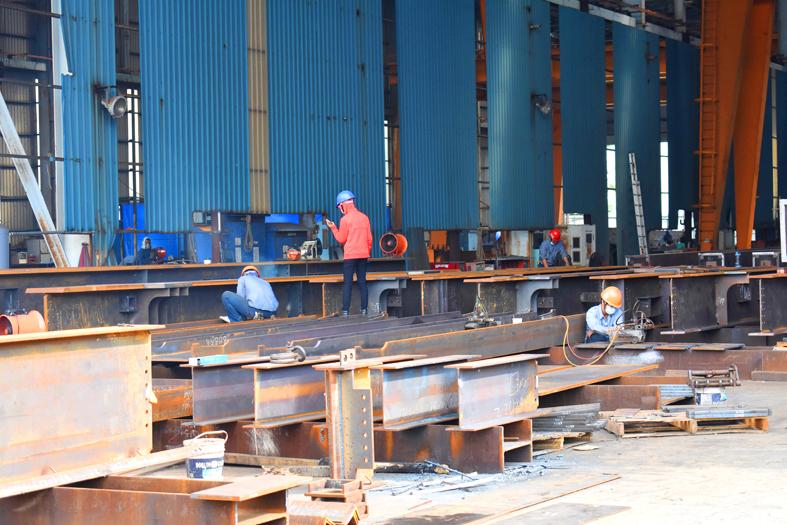The official manufacturing purchasing managers’ index (PMI) last month slipped into the contraction zone for the first time in two years, as firms from different sectors reported sluggish end-market demand and heavy pressure for inventory corrections, the Chung-Hua Institution for Economic Research (CIER, 中華經濟研究院) said yesterday.
The economic barometer last month shed 5.8 points — the fastest retreat in 10 years — to 47.8, ending the expansion cycle induced by COVID-19 for the past 24 months.
“Firms had better watch out for their account receivables to make sure they have sufficient cash flows during a slow season and economic uncertainty,” the Taipei-based think tank said.

Photo: Yang Chin-cheng, Taipei Times
PMI data seek to gauge the health of the manufacturing industry, with values larger than 50 suggesting expansion and those lower than the threshold indicating contraction.
Major sectors, especially electronics and optical device suppliers, were hit hard by an inventory glut and tepid sales, although suppliers of food products and transportation tools bucked the trend to remain in expansion mode, CIER said.
The critical sub-index on new business orders tumbled 10.8 points to 36.6, its worst level since June 2020, while the reading on industrial production shed 7.8 points to 43.8, it said.
S&P Global Market Intelligence made similar observations, saying that the operating conditions in Taiwan last month deteriorated at the quickest rate in more than two years and firms became increasingly conservative about their prospects.
“It seems likely that output could soften further in the months ahead unless there is a marked improvement in client demand,” S&P Global Market Intelligence economics associate director Annabel Fiddes said in a statement.
Fiddes blamed the downturn on languid global demand and rising production costs, which led to a sharp decrease in purchasing activity and inventory building.
Local manufacturers are looking at a bleaker picture moving forward, with the six-month business outlook shrinking 7 points to 30.1, despite the high season for technology products beginning, the CIER survey showed.
CIER president Chang Chuang-chang (張傳章) said that prices for base metals, plastics and other raw materials declined, but not fast enough, explaining why inventory adjustments have been slower than expected.
The institute urged companies, especially those reliant on a few customers and unable to negotiate prices, to carefully screen customers and raise cash positions to prevent potential cash stress in the coming months.
Service providers fared better last month as the non-manufacturing index gained 7 points to 56.7, rebounding to expansion territory, Chang said, attributing the pickup to a steady decline in the number of local COVID-19 cases.
However, firms are apprehensive about their business prospects, as wholesale, warehousing and logistics service providers depend heavily on exports, he said.
The caution is warranted as international research bodies trimmed their growth forecasts for the US and China, which account for more than 50 percent of Taiwanese exports, Chang added.

Taiwan’s foreign exchange reserves hit a record high at the end of last month, surpassing the US$600 billion mark for the first time, the central bank said yesterday. Last month, the country’s foreign exchange reserves rose US$5.51 billion from a month earlier to reach US$602.94 billion due to an increase in returns from the central bank’s portfolio management, the movement of other foreign currencies in the portfolio against the US dollar and the bank’s efforts to smooth the volatility of the New Taiwan dollar. Department of Foreign Exchange Director-General Eugene Tsai (蔡炯民)said a rate cut cycle launched by the US Federal Reserve

Handset camera lens maker Largan Precision Co (大立光) on Sunday reported a 6.71 percent year-on-year decline in revenue for the third quarter, despite revenue last month hitting the highest level in 11 months. Third-quarter revenue was NT$17.68 billion (US$581.2 million), compared with NT$18.95 billion a year earlier, the company said in a statement. The figure was in line with Yuanta Securities Investment Consulting Co’s (元大投顧) forecast of NT$17.9 billion, but missed the market consensus estimate of NT$18.97 billion. The third-quarter revenue was a 51.44 percent increase from NT$11.67 billion in the second quarter, as the quarter is usually the peak

The US government on Wednesday sanctioned more than two dozen companies in China, Turkey and the United Arab Emirates, including offshoots of a US chip firm, accusing the businesses of providing illicit support to Iran’s military or proxies. The US Department of Commerce included two subsidiaries of US-based chip distributor Arrow Electronics Inc (艾睿電子) on its so-called entity list published on the federal register for facilitating purchases by Iran’s proxies of US tech. Arrow spokesman John Hourigan said that the subsidiaries have been operating in full compliance with US export control regulations and his company is discussing with the US Bureau of

Pegatron Corp (和碩), a key assembler of Apple Inc’s iPhones, on Thursday reported a 12.3 percent year-on-year decline in revenue for last quarter to NT$257.86 billion (US$8.44 billion), but it expects revenue to improve in the second half on traditional holiday demand. The fourth quarter is usually the peak season for its communications products, a company official said on condition of anonymity. As Apple released its new iPhone 17 series early last month, sales in the communications segment rose sequentially last month, the official said. Shipments to Apple have been stable and in line with earlier expectations, they said. Pegatron shipped 2.4 million notebook